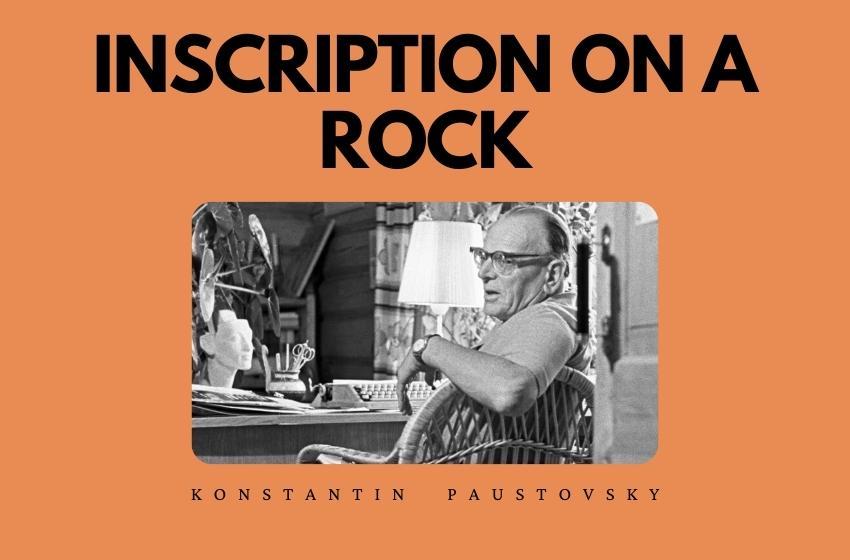"The writer's joy is complete only when he is convinced that his own conscience is in accord with that of his fellows."
Saltykov-Shchedrin
I remember living one winter in a seaside cottage on the Baltic dunes. Heavy snow lay all along the shore. And from the stately pines, too, snow was wafted down in fluffy strands by the wind and by the frisky little squirrels which, when it was very still, could be heard nibbling at the cones.
The sea was only a few yards away. To reach it I would walk down a little path past an empty cottage with curtained windows. Fluttered by the wind, which penetrated through various chinks, the curtains gave me the feeling that they were being drawn by someone who was furtively watching my movements.
The snow, patted with rabbit tracks, extended to the very edge of the water but the sea itself was unfrozen.
In stormy weather one heard not so much the roar of the surf as the crunching of ice and the rustling of settling snow. The Baltic shores are bleak and desolate in winter. The Latvians have christened the Baltic "Amber Sea" (Dzintara Jura), and they have done so, I think, not only because it casts up much amber, but because its waters have a yellowish amber tint.
All day long a thick mist lay low on the horizon, blurring the shoreline. Here and there the gloom was relieved by white sheets of shaggy snow.
Sometimes wild geese, which that year returned too early, settled in the water and gabbled interminably. Their cries were borne to the shore, but met with no response, for in winter the coastal woods have hardly any bird life.
By day, life in the little cottage where I lived was commonplace enough. The logs crackled in the painted tile stoves, the click of my typewriter cut through the silence and Lilya, my taciturn housekeeper, sat with her knitting in the cosy hall. But with the approach of evening a mysterious atmosphere descended on the place. In the pitch dark, the tall pines pressed in upon the cottage. And the gloom of the wintry night and the solitary sea seemed to advance and engulf me the moment I stepped out of the brightly lit hall into the darkness.
The sea stretched for hundreds of miles into the black, leaden distance, without the flicker of a light or a ripple anywhere—a misty vacancy on the extremity of which stood our little cottage like a lighthouse. This was land's end. I thought how strangely the tranquil gleaming lights in the cottage, the playing of the radio, the soft carpets muffling the sound of footsteps, the open books lying on the table contrasted with the vast forbidding emptiness outside!
To the west, in the direction of Ventspils, behind the wall of black fog, lay a little fishing village. It was a very ordinary village with the nets hung out to dry, and low-roofed cottages with smoke curling from the chimneys, with trustful, long-haired dogs, and black motor-boats lying on the beach.
Latvian fisherfolk have lived here for centuries. Generation succeeded generation. Fair-haired lasses with coy glances and musical accents became in the course of time weather-beaten old women, wrapped in heavy shawls, and brawny youths in jaunty caps changed into imperturbable greybeards.
These fisherfolk go out to sea to catch sprats just as their forefathers did centuries ago, and, as centuries ago, some of them never return, particularly in the autumn, when violent gales rage in the Baltic, its icy waters foaming and frothing like a devil's cauldron. Over and over again heads are bared for those lost at sea. But never do the fishermen think of abandoning the occupation, perilous and hard, passed on to them by fathers and grandfathers. Undaunted, they face the dangers season after season.
Not far from the village a granite rock rises from the sea. It bears the inscription, carved by fishermen long years ago: "In memory of those lost and yet to be lost at sea."
When a Latvian writer told me of this inscription it seemed to me to be as sad as most epitaphs. But the Latvian shook his head.
"It is a very brave inscription," he said. "It testifies to indomitable spirit, be the dangers what they may. I would use it as the epigraph to any book extolling man's labour and perseverance. I would give it this interpretation: 'In memory of those who sailed and continue to sail the sea.' "
I agreed, and thought the epigraph, suitably adapted, could be used about writers and their work.
Not for a minute can the writer retreat before difficulties or obstacles. No matter what happens he must carry on where his predecessors left off and fulfil the mission entrusted to him by his contemporaries. How right Saltykov-Shchedrin was when he said that even a minute's silence on the part of literature would be equivalent to the death of the nation.
It is utterly wrong to regard writing merely as a craft or occupation. Writing is the expression of a noble inner urge to create.
And what is it that makes the writer follow that urge through torment and joy?
First of all—the imperative call of his own heart.
The voice of conscience and faith in the future do not permit one who feels in himself the urge to write to lead a barren existence and not convey the multifarious thoughts and emotions with which his soul is overflowing.
Yet it needs more than the call of the heart to make a writer of a man. Mostly in our youth when the fresh world of our emotions has neither been tempered nor battered by life, we writers echo the call of our own hearts. In our mature years we heed a more emphatic call, the call of the times, of our people, of humanity. We long to contribute to the sharpness of man's vision.
A man will go through hell's fire, will perform miracles to follow his inner urge.
A striking example in this respect is the life of Edward Dekker, the Dutch writer, better known under the pen-name of Multatuli, which in Latin means "long-suffering."
Unfortunately the best of his writings have not come down to us. This is the saddest part of the story I wish to tell about him.
My thoughts turned to Dekker in the little cottage on the Baltic dunes—perhaps because the same bleak sea washes the Netherlands, his own land. Of that land he had said with bitterness and shame: "I am son of the Netherlands, son of a land of robbers, lying between Frieslancl and Scheldt."
Dekker was wrong, of course. There are civilized robbers in Holland, but they are a tiny minority and by no means typical of the Dutch people. We all know Holland as a land of hard-working people with the spirit of the rebel Claas and Thyl Uylenspiegel. The spirit of Claas lives in the hearts of many Dutchmen, just as it lived in the heart of Multatuli.
Multatuli came of patrician stock. As a young man he graduated the university with honours and soon received a government appointment in Java. Later, he became governor of one of the island's provinces. Renown, favour, riches—all awaited him, even possibly, the post of viceroy. But the rebel spirit of Claas burned in Multatuli who scorned worldly wealth.
With rare courage and persistence he fought to put an end to the age-old subjugation of the Javanese by the Dutch. He always sided with the down-trodden natives and sought to redress their grievances. Under him all bribery was severely punished. When the people of Java rose against their oppressors, Multatuli, the highly placed Dutch government official, deeply sympathized with "these trusting children," as he called the Javanese. He condemned his fellow-countrymen for their harsh and unjust policy.
He denounced the stratagem to which the Dutch generals had resorted. The latter decided to take advantage of the Javanese weakness for cleanliness; cleanliness is inherent in the Javanese who abhor all filth. Knowing this, the generals ordered their soldiers to assault the natives with human excrement. And the Javanese who had unflinchingly faced heavy artillery, quailed before this new trick and retreated.
Multatuli was not afraid to show his disdain for the Dutch generals and for the viceroy and his retinue—all self-professed Christians, of course. But what had they in common with the Christian maxim "Love thy neighbour as thyself"? His logic was unanswerable, but he could be put out of the way.
He was, of course, removed from his post and ordered home. As a member of the Dutch parliament for many years he pleaded for fair treatment for the Javanese, losing no opportunity to press his case, and sending petition after petition to the King and his ministers. But in vain! Nobody listened to him. They said he was a crank, even mad. His family went hungry.
It was then that he was seized by the urge to write. The urge evidently had been there all the time but now he felt a crying need to give it utterance. Mjultatuli wrote Max Havelaar, a scathing novel about the Dutch in Java. In this first attempt at fiction he was only feeling his way as a writer. But the book that followed, Love Letters, was written with amazing power, the power of one who had the courage of his convictions. In several chapters of this book he raises his voice in protest against the monstrous injustice that goes on in the world. In others he is caustic and witty in the pamphleteer manner. The last chapters are written with a touch of melancholy humour and are an attempt to revive that eager faith in humanity which is characteristic of childhood and youth.
"There can be no God, for God must be kind and good," writes Multatuli, and further: "When, alas, will they stop robbing the poor!"
Multatuli left Holland to look for earnings in other lands. His wife and children remained in Amsterdam— there was no money to pay for their fare.
Wrestling with poverty in the towns of Europe, Multatuli kept at his writing all the time—a mocking, tormented spirit, shunned by respectable society. Letters from home were few and far between. His poor wife was unable to spare the money for stamps. But he never ceased thinking of her and the children, especially of his youngest son; he feared that this little blue-eyed boy would lose his trust in people early in life and implored those at home to shelter him from needless disappointments.
Multatuli could find no publisher for his books.
But then the tide in his affairs unexpectedly turned. Some prominent Dutch publishers agreed to buy Multatuli's manuscripts on the condition that he relinquished. all publishing rights in their favour. Worn out by long struggling, Multatuli agreed. He returned to his native country. The publishers even advanced him a little money. But his books never saw light. Thus the offer to publish his works was merely a trick on the part of those in power to curb this staunch rebel whose pen made both the Dutch merchants and the government officials tremble for their safety.
Multatuli died with grim injustice staring him in the face. He died prematurely, died when so many more splendid books could have flowed from his pen, books written with the heart's blood.
Multatuli fought and perished in the struggle. He never flinched, but fought courageously, combining the life of militant politician and militant writer. Perhaps in the near future a monument will be erected to this great and unselfish man in Djokjakarta, capital of independent Java.
In passionate devotion to a purpose Multatuli had an equal in the painter Vincent van Gogh, also a Dutchman and his contemporary.
It is hard to find an example of greater self-abnegation in the name of art than is the life of Vincent van Gogh, who dreamed of setting up in France a sort of painters' community, the members of which could devote themselves wholly to their art.
How greatly van Gogh had suffered is well known. In his Potato Eaters and Prisoners Walk he shows the very depths of human despair. Yet it was not suffering he wished to portray but the joy of life.
Van Gogh's heart went out in sympathy for his fellow-creatures. It was to give them joy that he used to the full his extraordinary gift—the gift of seeing the world bathed in a wealth of colour and hues.
He longed to fill his canvases with joy. He painted his landscapes so that they seemed dipped in some miraculous fluid. There was such brilliance and solidity to his colours that every gnarled tree was like a sculpture and every clover field a warm stream of sunlight. He was a painter who used to the greatest possible effect every tint of colour, every hue.
He was poor, proud and impractical. He shared every bit of bread he had with the homeless and knew only too well from his own experience what social injustice was. He scorned cheap glory.
He was not a fighter—not one by nature. But he possessed heroism, the heroism of one who had a fanatical faith in a bright future for all men, for tillers of the soil, for miners, poets and scholars. But he was eager to say something to the world and he said it in the pictures he painted. Like all artists he expressed beauty. He chose to do it through the medium of colour. He was always deeply fascinated by Nature's wonderful colour combinations, showing how Nature's colours were ever changing, yet ever beautiful in every season and in every corner of the earth.
We must reconsider our appraisal of such painters as Vincent van Gogh, Vrubel, Borisov-Musatov, Gauginand many others. The people of socialist society are heirs to all the spiritual riches of the world. We must banish from our midst the philistine and the hypocrite who rant against beauty which exists despite their efforts to crush it.
From discussing literature I have wandered into the realm of painting. I have done this because acquaintance with all arts helps the writer to achieve perfection in his own field. But that is something I shall deal with later.
The sense that his vocation is one of the noblest there is must ever be present with the writer. A sober outlook and literary experience are nothing as compared with it. But the writer must not indulge in false heroics, nor in self-exaltation. He must not have an exaggerated notion of his role in society—nor of any of the qualities sometimes attributed to him as to a "being apart."
Mikhail Prishvin, a writer well aware of the high mission of literature, one who has indeed given his whole life to writing, said: "A writer is happy to regard himself not as one who stands apart from his fellow-men, but as one of the same flesh as they."
1955
Translated by Susanna Rosenberg





















